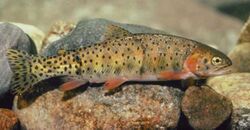Biology:Colorado River cutthroat trout
| Colorado River cutthroat trout | |
|---|---|

| |
| Scientific classification | |
| Domain: | Eukaryota |
| Kingdom: | Animalia |
| Phylum: | Chordata |
| Class: | Actinopterygii |
| Order: | Salmoniformes |
| Family: | Salmonidae |
| Genus: | Oncorhynchus |
| Species: | |
| Subspecies: | O. c. pleuriticus
|
| Trinomial name | |
| Oncorhynchus clarkii pleuriticus (Cope, 1872)
| |
The Colorado River cutthroat trout (Oncorhynchus clarki pleuriticus) is a subspecies of cutthroat trout native only to the Green and Colorado River basins, which are west of the Continental Divide. Cutthroat trout found in other river basins belong to other subspecies.
Range
In the past, this subspecies was found throughout portions of the Colorado River drainage in Wyoming, Colorado, Utah, Arizona, and New Mexico. However, today scientists believe this fish occupies 13% of its historic range (Range-Wide Status of Colorado River Cutthroat Trout (Oncorhynchus clarkii pleuriticus): 2005).

Colorado River cutthroats are thought to have occupied the basin of upper Muddy Creek, a tributary of the Little Snake River (which ultimately flows into the Colorado River) in southern Carbon County, Wyoming. Historical accounts in letters and diaries refer to them as "mountain trout" or "speckled trout." The fish may have begun to disappear from the upper Muddy Creek in the 1850s as a result of physical changes made to the environment by travelers, the introduction of the brook trout and other non-native species, and possibly the over-trapping of beavers, which affected dams and dependent habitats.
A distinct lineage of Colorado River cutthroat trout known as the San Juan cutthroat was also found in the San Juan River and its tributaries, and was identified in 2012 by genetic testing of two specimens collected in 1874 near Pagosa Springs. While feared extinct, 8 isolated populations were discovered in and around the San Juan National Forest in mid-2018. Shortly after the rediscovery of the San Juan cutthroat, their remnant populations were threatened by the 416 Fire, which was closing in on their remaining habitat. In response, 58 San Juan cutthroats were removed from two remote creeks north of Durango and are being held in hatcheries, with the ultimate goal of captive breeding and reintroduction.[2][3]
Conservation
Rangewide Conservation Agreements and Management Strategies are in place for this species.[4]
The Wyoming Game and Fish Department in cooperation with the Bureau of Land Management, Little Snake Conservation District, the U.S. Fish and Wildlife Service and Trout Unlimited have successfully reintroduced Colorado River cutthroat into the Little Snake River basin. Efforts have included improving stream habitat and removing non-native species.
See also
- Fishing in Wyoming
Notes
- Citations
- ↑ NatureServe (6 October 2023). "Oncorhynchus clarkii pleuriticus". Arlington, Virginia: NatureServe. https://explorer.natureserve.org/Taxon/ELEMENT_GLOBAL.2.105178/Oncorhynchus_clarkii_pleuriticus.
- ↑ "Colorado biologists rediscover fish long thought to be extinct — then rescue them as wildfire advances" (in en-US). The Denver Post. 2018-09-06. https://www.denverpost.com/2018/09/05/colorado-san-juan-cutthroat-trout/.
- ↑ Votel, Missy. "DNA test leads to discovery of San Juan cutthroat - Durango Telegraph" (in en). https://www.durangotelegraph.com/news/top-stories/dna-test-leads-to-discovery-of-san-juan-cutthroat/.
- ↑ CONSERVATION AGREEMENT FOR COLORADO RIVER CUTTHROAT TROUT (Oncorhynchus clarkii pleuriticus) in the States of Colorado, Utah, and Wyoming[yes|permanent dead link|dead link}}]
- Sources
- "Colorado River Cutthroat Trout Reintroduction". United States Bureau of Land Management, Rawlins (Wyoming) Field Office. 2006-02-02. http://www.wy.blm.gov/rfo/fisheries.htm.
- Wyoming Fish & Game Commission
Further reading
- Trotter, Patrick C. (2008). Cutthroat: Native Trout of the West (2nd ed.). Berkeley, CA: University of California Press. ISBN 978-0-520-25458-9.
Wikidata ☰ Q5148902 entry
 |


